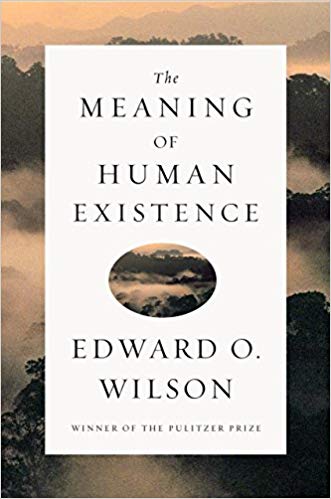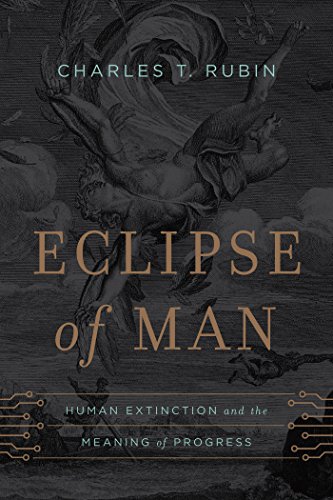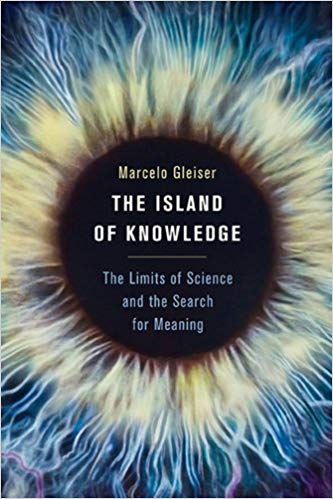The Meaning of Life
Three books explore, from a scientific perspective, what it means to be human and what the purpose of our existence might be.
The Meaning of Human Existence
Edward O. Wilson. 2014. W.W. Norton & Company, Liveright Publishing Corporation, New York. 208 pages.
Eclipse of Man: Human Extinction and the Meaning of Progress
Charles T. Rubin. 2014. Encounter Books, New York. 200 pages.
The Island of Knowledge: The Limits of Science and the Search for Meaning
Marcelo Gleiser. 2014. Perseus Books Group, Basic Books, Philadelphia. 368 pages.
Life is full of enduring questions: Are we there yet? What’s for dinner? Does this make me look fat? The deepest questions dig down to true and timeless mysteries, though the most fundamental can be simply stated: Is there meaning to human life? Is there meaning to my life?
In much of the biblical book of Ecclesiastes, King Solomon wrote of our lives as a time of vain intrigues, injustices, hard work, poor decisions and finally death—a return to the dust. That’s a depressing picture, yet he descended further. Seemingly abandoning all hope, he appears to imply that even God is sometimes against us. “Consider what God has done: Who can straighten what he has made crooked?” (Ecclesiastes 7:13, New International Version).
Solomon’s sense of meaning is not optimistic—the weight of life’s burdens is heavy, and our motivations are sketchy: “I saw that all labor and all achievement spring from man’s envy of his neighbor. This too is meaningless, a chasing after the wind” (Ecclesiastes 4:4, NIV). More than two dozen times Solomon asserted that human striving is “meaningless,” and nine times he depicted the futility of life as “chasing after the wind.” Surely there is more to his message, but its general gloominess presents little to immediately inspire optimism regarding humankind’s purpose or fate.
Almost 3,000 years later, the leading scientific theory of human origins validated Solomon’s apparent despair. Charles Darwin’s 1859 Origin of Species put the scientific nails in the coffin of human meaning. There was merely biological existence, he declared—terrestrial, not transcendent. There was no “plan,” no teleological target or endpoint that nature somehow had in mind for creation. Humankind was not nature’s (nor God’s, for that matter) goal or high point; we were simply a late-budding twig on the great tree of common descent.
In 1978 Edward O. Wilson wrote that “no species, ours included, possesses a purpose beyond the imperatives created by its genetic history.” Our dilemma, he added, “is that we have no particular place to go” (On Human Nature).
This evolutionary worldview brings us back to Ecclesiastes. Although not using a Darwinian rubric, Solomon’s ancient synthesis summed up the human experience as one of random events playing out in an unforgiving world. “The race is not to the swift or the battle to the strong, nor does food come to the wise or wealth to the brilliant or favor to the learned; but time and chance happen to them all” (Ecclesiastes 9:11).
The question of meaning challenged the prescientific wisdom of Solomon, and it continues to challenge us today. Is modern science giving us better insight into who and what we are and why we exist?
The Wilson-Centric View
For 40 years, Wilson’s writing has set the benchmark in advancing an evolution-based humanism and the evolutionary causes of social structure. Because our sense of meaning is closely connected to our relationships and social nature, his body of work has proven critical for its clarity in promoting the Darwinian view, but it also serves as a lightning rod for critics of human evolutionary theory.
Earning him the Pulitzer Prize for nonfiction in 1979, On Human Nature was Wilson’s first treatise on the nature and future of humankind. It followed on from his now classic Sociobiology: The New Synthesis (1975), where he expounded an evolutionary outline for the origin of social structure in animal societies. Based on his work with social insects (primarily ants), Wilson introduced the controversial idea that human social behavior differed little from what could be observed in the rest of the natural world.
“Human existence may be simpler than we thought. There is no predestination, no unfathomed mystery of life. Demons and gods do not vie for our allegiance. Instead, we are self-made, independent, alone, and fragile.”
Now in his 80s, Wilson has enjoyed a full career as taxonomist, writer and Harvard ecologist. Although once assaulted by a group who dumped a pitcher of water on him while crying “Wilson, you’re all wet!” he has been true to his convictions across the decades. His 2014 book, The Meaning of Human Existence, is an inviting and clearly written capstone, a kind of summary statement of his argument for human sociobiology.
As for meaning, the book’s introduction clearly sets out “the worldview of science” and thus the author’s own perspective: “The accidents of history, not the intentions of a designer, are the source of meaning.” Wilson’s mission continues to be to tease out those accidents and to raise our evolutionary backstory to the level of cultural truth. In other words, the sciences and the humanities must come to a common understanding of what humans are and why we do the things we do, based on an evolutionary perspective.
If we are ever to come to some universal agreement about how to manage ourselves and our relationships on this planet, Wilson believes we must make a shift from what he sees as the outdated mythologies of make-believe history to the facts of evolutionary science: “In traditional explanations of the past, religious creation stories have been blended with the humanities to attribute meaning to our species’ existence.” Wilson believes this is psychological baggage full of faux meaning, and that it must be jettisoned: “The time has come to consider what science might give to the humanities and the humanities to science in a common search for a more solidly grounded answer than before to the great riddle of our existence.”
Evolving Altruism
Developing an evolutionary explanation for our social behavior and our sense of purpose is a long-standing problem for science. For example, how could altruism and self-sacrifice evolve in a heritable way? In a survival-of-the-fittest world, how would the gene/allele for such a trait survive?
In The Meaning of Human Existence, Wilson devotes both a chapter and the appendix to his best explanation for this conundrum. The currently prevailing theory, called “inclusive fitness,” explains altruism as the unconscious willingness to cooperate for the betterment of a close relative who shares your genes. While he says this idea, known as kin selection, was “enchanting” to him in the past, he now finds it inadequate. In its place, Wilson proposes that it is not genes alone but a synergy of culture, genes and epigenetics that create group interdependence or “eusociality.” He describes this as members of a group cooperatively raising young across multiple generations.
Wilson suggests that after following the same presumed evolution in social development as insects did, humans jumped the rails of individual anonymity to become group-aware. “The creation of groups from personal and intimate mutual knowledge,” Wilson surmises, “was the unique achievement of humanity. . . . The origin of the human condition is best explained by the natural selection for social interaction—the inherited propensities to communicate, recognize, evaluate, bond, cooperate, compete, and from all these the deep warm pleasure of belonging to your own special group.”
Thus the problem of purpose and meaning is an illusion of innate tribalism; we create meaning by being part of a group (an extended family, a team, a church, a social community). Wilson remains entirely and consistently materialistic: humanity “arose entirely on its own through an accumulated series of events during evolution. We are not predestined to reach any goal, nor are we answerable to any power but our own.”
Homo Sapiens 2.0
In his Eclipse of Man, Charles Rubin carries this power forward. He focuses his attention on the wide-ranging concept of transhumanism, the idea that technology is granting us the ability to recreate both ourselves and nature: “Manipulating nature is simply part of what defines us as human beings. The growing abilities of modern science and technology that stem from this trait are giving us the power to take evolution into our own hands; ongoing competition will force us to use technological evolution to improve not only on the naturally given ‘outside’ of us but also on our selves.”
When one considers the ever-present hardships and vagaries of life (as Solomon succinctly laid out), it seems natural that, as we understand the structure of the world and ourselves more scientifically, we would put that knowledge to work in improving the human condition. The problem with playing this out is embedded in the book’s subtitle: Human Extinction and the Meaning of Progress. Does progress ultimately require the extinction of our species as we know it today? Progress is not easily defined without a wider sense of what life is all about. Is the act of choice where meaning is found?
“Since science and technology as such offer few if any resources for ethical reflection, on their own they leave us with a painfully thin understanding of the shape of human life.”
Rubin explains that transhumanism’s “essential insight” is that our capacity to reengineer ourselves has made us, for better or worse, our own god. Because it is also an essential fact that humans are innately defective, Rubin continues, the ultimate solution is to replace ourselves with a kind of Homo sapiens 2.0: “The transhumanists believe that if we are to prevent some of the more common apocalyptic visions from becoming reality, we must redesign humanity so that our ruinous flaws can be eliminated.”
In all of this Rubin is skeptical, but it’s often difficult to find his voice apart from his copious quotes and references. The reader must remember the author’s initial warning and question: “Deliberately seeking our own extinction represents the extreme limit of how far we could want to go to overcome our given circumstances and raises in an obvious way a question that is always lurking in our rapidly changing world: What kind of future are we trying to create?”
That, he says, is the moral question he wants to investigate. Each of his five chapters lays out one particular segment of the transhumanist march toward the so-called Singularity—the convergence of modern technologies that will allow, to put it simply, our species’ rebirth—dehumanized to become something beyond human. What might that something be, and how will it manage its own becoming?
Making Progress?
In the body of the book, Rubin explores the ideas of destiny. What is it that will take us beyond human? Will extraterrestrials come down and show us the way (chapter 2)? Will the reductionism made possible by nanotechnology be our savior (chapter 3)? Will we be able to genetically modify and/or download our minds to become immortal flesh or silicon chips (chapter 4)?
Each chapter begins with a brief vignette illustrating the theme and the problem to be examined. Rubin, a professor of political science, also uses a clever collection of science-fiction writing and film in forming his counter arguments. A long discourse on Arthur C. Clarke’s Childhood’s End, an extended examination of K. Eric Drexler’s Engines of Creation, and an insightful review of the film Eternal Sunshine of the Spotless Mind serve as his exemplars. Rubin concludes with an analysis of three paintings depicting the story of Daedalus and the fall of Icarus.
In the end, Rubin sees it all as smoke and mirrors, a fantasy future that distracts us from the present and from the real-world problems that need our attention: “The transhumanist arguments obscure what is present in front of us in this world; its imperfections and failures, for example, are swept away in a tide of technological determinism drawing us on to some distant horizon of imagined possibilities. That transhumanist farsightedness is then taken to be the best framework by which to give a trivializing and dismissive meaning to present-day things.”
Sorting Fact From Fiction
Rubin concludes that a right and helpful sense of progress would seek to make today’s world a better place. “The kind of modesty that we need [which would allow us to be clear-eyed about today rather than dream of an imagined tomorrow],” he says, “acknowledges that there is much that can and ought to be done to make human lives better, and that science and technology will play a major role in that effort.”
Marcelo Gleiser would agree. In The Island of Knowledge, Gleiser, a professor of physics, astronomy and natural philosophy, explores the history of science, how it works, and what it reveals. His goal is to present a realistic view of the process and possibilities of investigating the physical world. The “land,” the “island” of his title, is that which we have come to know. All that remains a mystery is the “water.” Ironically, the more we know, the longer the shoreline extends and the more water we see. In other words, the more we know, the more we realize we don’t know.
“Not all questions have answers. To hope that science will answer all questions is to want to shrink the human spirit, clip its wings, rob its multifaceted existence. And given this book’s explorations of the limits of scientific knowledge, it is also a deeply misguided hope.”
“As we learn more about the world, confronting theories with data, probing deeper and further,” he writes, “we realize that the answers we gather are steps that go mostly forward but sometimes back: the Island of Knowledge grows and sometimes shrinks, as we learn something new about the Universe or take something back.”
The book is divided into three main sections, each devoted to what one could call the big ideas of scientific exploration. The first concerns the history of observational tools and the development of astronomy and then cosmology, from the telescope to the multiverse theory.
There are no surprises here, but Gleiser uses the material well to illustrate that “what we call ‘real’ is contingent on how deeply we are able to probe reality.” But our sense of reality is incomplete. It is important to remember, Gleiser insists and repeats, that because “we only have limited access to Nature through our tools and, more subtly, through our restricted methods of investigation, our knowledge of the natural world is necessarily limited.”
Gleiser is refreshingly honest in explaining what science can and cannot do. Separating fact from speculation is an important facet of both the scientific process and scientific reporting. Theories have limits, and this is often overlooked, unmentioned or glossed over when making broad generalizations that may stretch them beyond their boundaries. He cautions, “This is not an uncommon trend in science: when a compelling idea starts to sputter, progressively more manic attempts to rescue it are put forward, even if seemingly requiring desperate measures.”
In this vein, he notes that the theories of modern cosmology are “a fantastic concoction that ‘works’” in that it seems to hold together in the abstract. However, he acknowledges, “neither cosmic inflation nor the multiverse brings us any closer to an understanding of the ultimate origin of all things.” The theory of inflation, for example, is more hypothesis than theory, more hope than substance. Remember, Gleiser writes, “inflation was designed to solve” observations that are incompatible with standard Big Bang cosmology. “It is thus no big surprise that it does.”
“How arrogant it is to claim that we can know it all, that we will be able to pry open all of Nature’s secrets one after another like nested Russian dolls until we decipher the very last one!”
The book’s second section can be summed up as the problem of atoms: What are they? Where do they come from? How do they work? How are atoms and energy related? It’s a mini-course in quantum physics. The third focuses on the human mind: Do we invent or discover? Is math real or a product of our amazing imagination? “The discussion of mathematics being an invention or a discovery, like the discussion of the nature of physical reality, points more to the importance of the human brain as a rare and wondrous oddity in the Universe than to elusive truths written in some imponderable abstract realm.”
Meaning: Where to Look
The discoveries of the sciences tell us many things about ourselves. But the answer to the question of human meaning remains hidden. Is it still “out there,” to be found under Gleiser’s ocean beyond the shore? Or might it be a buried treasure right under our feet? “Not all questions have answers,” he writes. “. . . We strive toward knowledge, always more knowledge, but must understand that we are, and will remain, surrounded by mystery.”
Because the range of our equipment is limited, seeing below the surface may never be possible. “It is one thing to search for answers to questions of origins and endings, of meaning and purpose within the scientific framework—that we must do, always. . . . It is another to actually believe that the search has an end, that the ocean of the unknown is bounded and that science alone can chart its expanse.”
Wilson diagrams the human dilemma as the friction of two interacting systems: one directs us toward virtuous, group-oriented behavior, the other toward actions that enhance self at the cost of others. Rubin questions whether we can ever find the right balance in directing our steps forward. And Gleiser questions our ability to be content with the unknowns.
Gleiser concludes, “[Any] scientific explanation is necessarily limited. I understand that it is hard for some to accept that this limitation doesn’t take away from the beauty and explanatory power of science.” Science is not a “conqueror of all mysteries.” We must not, he says, confuse the goal of absolute knowledge with the drive to keep on searching. Science is only human: “impressive, multifaceted, and imperfect.”
Are we then stuck in a loop, so that what we discover leads only to another question? We seek meaning but never reach the end of the journey. Gleiser’s perspective therefore rings true; the solution to one mystery just opens another. Are we indeed “chasing the wind” when we seek purpose and meaning?
Solomon also recognized this confusion. “Be warned: there is no end of opinions ready to be expressed. Studying them can go on forever and become very exhausting!” (Ecclesiastes 12:12, The Living Bible).
Even in his frustrations, however, Solomon recognized God’s sovereignty and was assured of one thing: even if God’s action in the world is mysterious, God is real. From that foundation he made his closing remark: “Here is my final conclusion: fear God and obey his commandments, for this is the entire duty of man” (verse 13). Although human life seemed futile, he determined that keeping the law of God remained an obligation that would one day be rewarded. Most cannot come to that conclusion today, if only because they believe that greater meaning is a product of our imaginations alone.
Without faith that a Creator exists and has a plan for His creation, we are left alone to invent it for ourselves. In doing so we search myriad paths that claim to reveal the meaning and purpose of human existence. The paths crisscross and overlap, join and separate; religion, evolution, psychology, eusociality, science, culture, ethnology and genetics all offer some gateway to understanding our place in the world—why we are here and what we should do. And yet for most people the goal remains elusive.
Solomon remained troubled overall, but he understood where knowledge would ultimately be found. “How does a man become wise? The first step is to trust and reverence the Lord!” he wrote (Proverbs 1:7, TLB).
To get on the right track to discovering the meaning of existence requires acceptance of a reality beyond the easily visible. One must admit that God exists to begin the journey.
And so the eternal question remains: Are we there yet?




